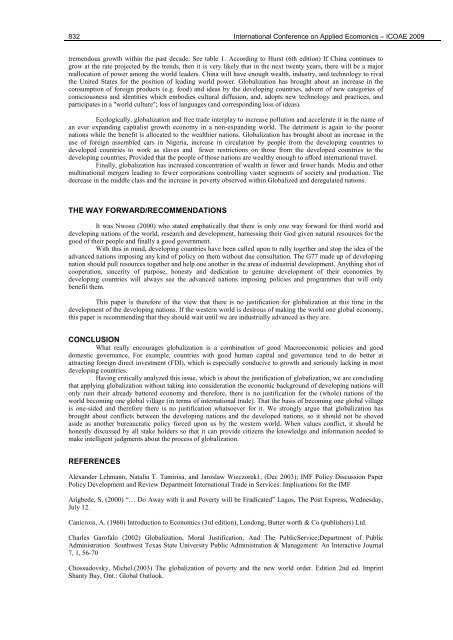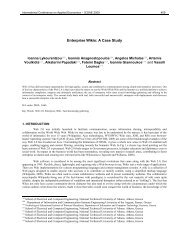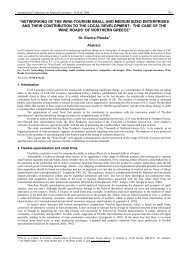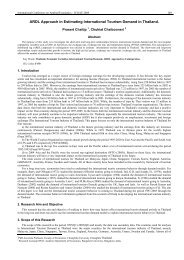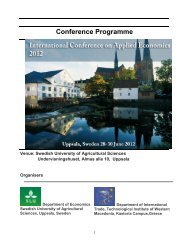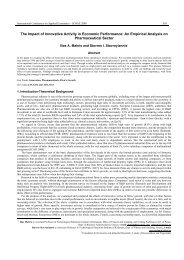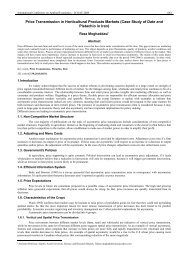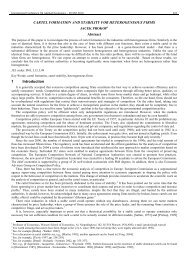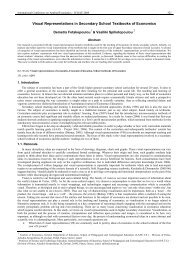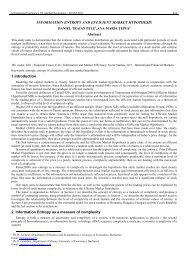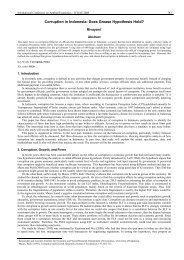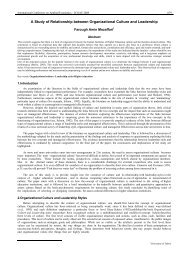Globilisation, Trade and Financal Liberisation: Implication for the ...
Globilisation, Trade and Financal Liberisation: Implication for the ...
Globilisation, Trade and Financal Liberisation: Implication for the ...
You also want an ePaper? Increase the reach of your titles
YUMPU automatically turns print PDFs into web optimized ePapers that Google loves.
832 International Conference on Applied Ecomonics – ICOAE 2009<br />
tremendous growth within <strong>the</strong> past decade. See table 1. According to Hurst (6th edition) If China continues to<br />
grow at <strong>the</strong> rate projected by <strong>the</strong> trends, <strong>the</strong>n it is very likely that in <strong>the</strong> next twenty years, <strong>the</strong>re will be a major<br />
reallocation of power among <strong>the</strong> world leaders. China will have enough wealth, industry, <strong>and</strong> technology to rival<br />
<strong>the</strong> United States <strong>for</strong> <strong>the</strong> position of leading world power. Globalization has brought about an increase in <strong>the</strong><br />
consumption of <strong>for</strong>eign products (e.g. food) <strong>and</strong> ideas by <strong>the</strong> developing countries, advent of new categories of<br />
consciousness <strong>and</strong> identities which embodies cultural diffusion, <strong>and</strong>, adopts new technology <strong>and</strong> practices, <strong>and</strong><br />
participates in a "world culture"; loss of languages (<strong>and</strong> corresponding loss of ideas).<br />
Ecologically, globalization <strong>and</strong> free trade interplay to increase pollution <strong>and</strong> accelerate it in <strong>the</strong> name of<br />
an ever exp<strong>and</strong>ing capitalist growth economy in a non-exp<strong>and</strong>ing world. The detriment is again to <strong>the</strong> poorer<br />
nations while <strong>the</strong> benefit is allocated to <strong>the</strong> wealthier nations. Globalization has brought about an increase in <strong>the</strong><br />
use of <strong>for</strong>eign assembled cars in Nigeria, increase in circulation by people from <strong>the</strong> developing countries to<br />
developed countries to work as slaves <strong>and</strong> fewer restrictions on those from <strong>the</strong> developed countries to <strong>the</strong><br />
developing countries, Provided that <strong>the</strong> people of those nations are wealthy enough to af<strong>for</strong>d international travel.<br />
Finally, globalization has increased concentration of wealth in fewer <strong>and</strong> fewer h<strong>and</strong>s. Media <strong>and</strong> o<strong>the</strong>r<br />
multinational mergers leading to fewer corporations controlling vaster segments of society <strong>and</strong> production. The<br />
decrease in <strong>the</strong> middle class <strong>and</strong> <strong>the</strong> increase in poverty observed within Globalized <strong>and</strong> deregulated nations.<br />
THE WAY FORWARD/RECOMMENDATIONS<br />
It was Nwosu (2000) who stated emphatically that <strong>the</strong>re is only one way <strong>for</strong>ward <strong>for</strong> third world <strong>and</strong><br />
developing nations of <strong>the</strong> world, research <strong>and</strong> development, harnessing <strong>the</strong>ir God given natural resources <strong>for</strong> <strong>the</strong><br />
good of <strong>the</strong>ir people <strong>and</strong> finally a good government.<br />
With this in mind, developing countries have been called upon to rally toge<strong>the</strong>r <strong>and</strong> stop <strong>the</strong> idea of <strong>the</strong><br />
advanced nations imposing any kind of policy on <strong>the</strong>m without due consultation. The G77 made up of developing<br />
nation should pull resources toge<strong>the</strong>r <strong>and</strong> help one ano<strong>the</strong>r in <strong>the</strong> areas of industrial development. Anything shot of<br />
cooperation, sincerity of purpose, honesty <strong>and</strong> dedication to genuine development of <strong>the</strong>ir economies by<br />
developing countries will always see <strong>the</strong> advanced nations imposing policies <strong>and</strong> programmes that will only<br />
benefit <strong>the</strong>m.<br />
This paper is <strong>the</strong>re<strong>for</strong>e of <strong>the</strong> view that <strong>the</strong>re is no justification <strong>for</strong> globalization at this time in <strong>the</strong><br />
development of <strong>the</strong> developing nations. If <strong>the</strong> western world is desirous of making <strong>the</strong> world one global economy,<br />
this paper is recommending that <strong>the</strong>y should wait until we are industrially advanced as <strong>the</strong>y are.<br />
CONCLUSION<br />
What really encourages globalization is a combination of good Macroeconomic policies <strong>and</strong> good<br />
domestic governance, For example, countries with good human capital <strong>and</strong> governance tend to do better at<br />
attracting <strong>for</strong>eign direct investment (FDI), which is especially conducive to growth <strong>and</strong> seriously lacking in most<br />
developing countries.<br />
Having critically analyzed this issue, which is about <strong>the</strong> justification of globalization, we are concluding<br />
that applying globalization without taking into consideration <strong>the</strong> economic background of developing nations will<br />
only ruin <strong>the</strong>ir already battered economy <strong>and</strong> <strong>the</strong>re<strong>for</strong>e, <strong>the</strong>re is no justification <strong>for</strong> <strong>the</strong> (whole) nations of <strong>the</strong><br />
world becoming one global village (in terms of international trade). That <strong>the</strong> basis of becoming one global village<br />
is one-sided <strong>and</strong> <strong>the</strong>re<strong>for</strong>e <strong>the</strong>re is no justification whatsoever <strong>for</strong> it. We strongly argue that globalization has<br />
brought about conflicts between <strong>the</strong> developing nations <strong>and</strong> <strong>the</strong> developed nations, so it should not be shoved<br />
aside as ano<strong>the</strong>r bureaucratic policy <strong>for</strong>ced upon us by <strong>the</strong> western world. When values conflict, it should be<br />
honestly discussed by all stake holders so that it can provide citizens <strong>the</strong> knowledge <strong>and</strong> in<strong>for</strong>mation needed to<br />
make intelligent judgments about <strong>the</strong> process of globalization.<br />
REFERENCES<br />
Alex<strong>and</strong>er Lehmann, Natalia T. Tamirisa, <strong>and</strong> Jaroslaw Wieczorek1, (Dec 2003); IMF Policy Discussion Paper<br />
Policy Development <strong>and</strong> Review Department International <strong>Trade</strong> in Services: <strong>Implication</strong>s <strong>for</strong> <strong>the</strong> IMF<br />
Arigbede, S. (2000) ―… Do Away with it <strong>and</strong> Poverty will be Eradicated‖ Lagos, The Post Express, Wednesday,<br />
July 12.<br />
Canicross, A. (1960) Introduction to Economics (3rd edition), Londong, Butter worth & Co (publishers) Ltd.<br />
Charles Garofalo (2002) Globalization, Moral Justification, And The PublicService;Department of Public<br />
Administration Southwest Texas State University Public Administration & Management: An Interactive Journal<br />
7, 1, 56-70<br />
Chossudovsky, Michel.(2003) The globalization of poverty <strong>and</strong> <strong>the</strong> new world order. Edition 2nd ed. Imprint<br />
Shanty Bay, Ont.: Global Outlook.


